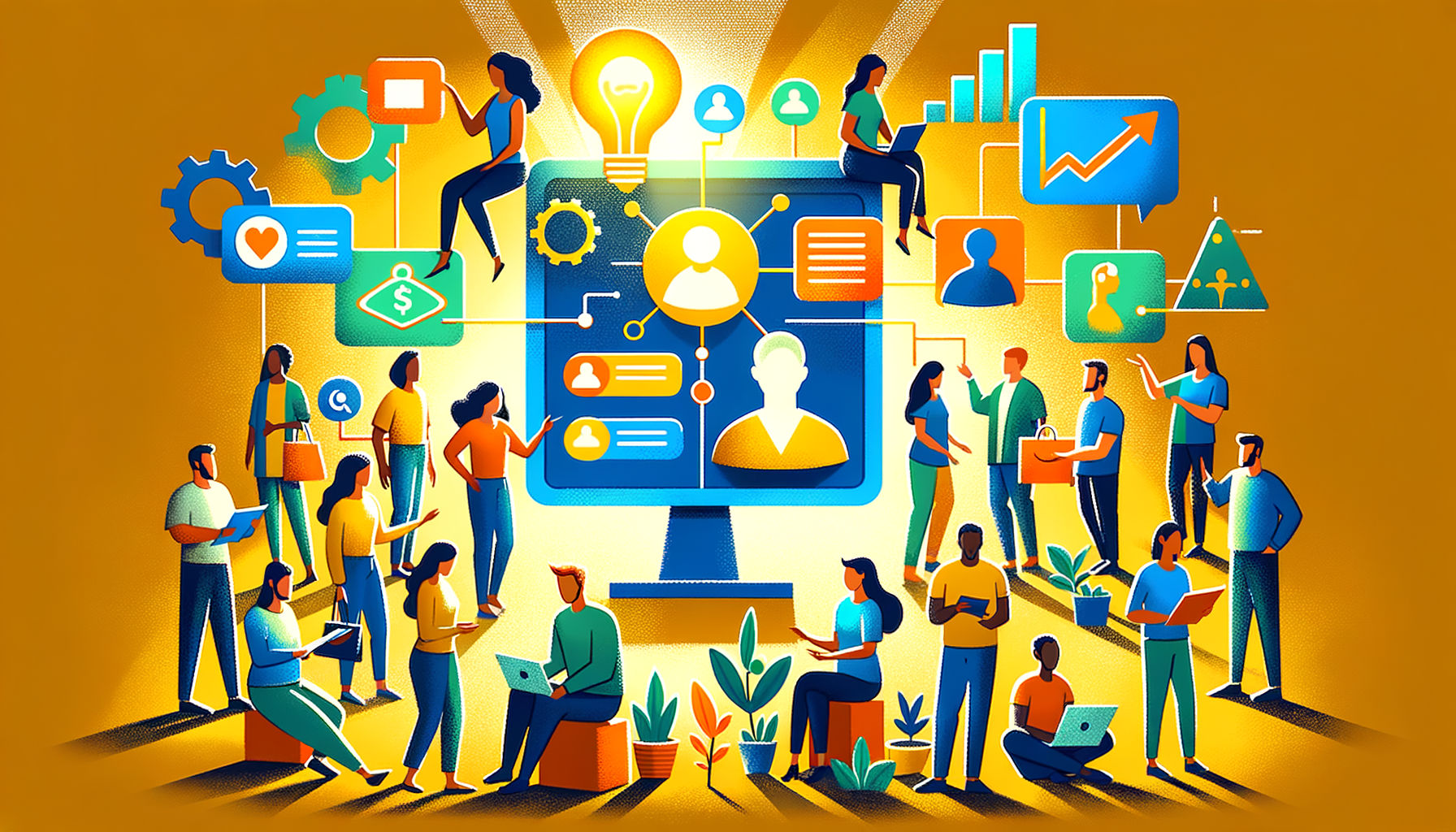Understanding CRM Basics for Nonprofits
Introduction to CRM Systems for Nonprofits
Nonprofit CRM systems, or customer relationship management for nonprofits, help manage donor information, enhance engagement strategies, and optimize fundraising. These systems enable nonprofits to manage supporter profiles, process payments efficiently, and organize events. They keep fundraising campaigns well organized. Finding a CRM that not only handles your donors, but all of your operational needs, can be difficult.

Key Features of Effective Nonprofit CRMs
Effective nonprofit CRMs, or the best CRM for non profits, support the unique needs of charitable organizations with several key features:
- Supporter Profiles: Store and manage constituent information, enhancing the donor experience through, including contact details and engagement history. This enables personalized communication.
- Payment Processing: Simplifies the donation process, handling financial transactions efficiently by reducing administrative tasks. It ensures quick financial data recording.
- Event Management: Provides tools for registration, ticketing, and post-event analysis, facilitating effective event management.
- Fundraising Campaign Management: Helps plan and execute campaigns with donation tracking and performance analysis.
- Marketing Tools: Includes email marketing, social media integration, and targeted communication for effective outreach.
- Data Security and Compliance: Protects sensitive information, ensuring data security and compliance with data protection regulations.
- Reporting and Analytics: Offers insights into donor behavior and organizational growth to maximize efficiency.
- Integrations: Connects with other tools like accounting software and payment gateways for cohesive workflow.
- Volunteer Management: The ability to handle your donors and volunteers in single platform can streamline use and operations.
Identifying a CRM that includes these features is crucial for nonprofits. It means finding a system that aligns with their operational needs and goals.
Understanding the Importance of CRM Adoption Rates
The success of a CRM system in a nonprofit depends on its features and adoption by the staff. Higher adoption rates improve operational efficiency and scalability of the organization. Choose a user-friendly CRM to encourage widespread use. This maximizes the investment's full potential.
Highlighting Best CRM Systems for Nonprofits
Selecting the right Customer Relationship Management (CRM) system, or the best CRM for non profits, is crucial for nonprofits aiming to make the most of their budget. A CRM that staff readily adopts can help by meeting your organization's specific needs.
Choosing a CRM that includes essential features will help your nonprofit manage relationships, process donations, organize events, and ensure data security. For further details on these features, consider consulting the comprehensive guide at Double the Donation.
How to Choose a CRM for Your Nonprofit
Selecting the best CRM for non profits or the right Customer Relationship Management (CRM) system is crucial for scaling a nonprofit. With a variety of CRMs designed for nonprofits, it’s vital to embark on a comprehensive selection process. This involves conducting a needs assessment, identifying essential features, evaluating integration and compatibility, and considering cost implications to find a CRM that aligns with your organization's unique needs and operational goals.
Practical Steps in CRM Selection
Assessing Your Nonprofit's Needs
Begin by evaluating your nonprofit's operational scale, data volume, and the types of relationships you need to manage. Understanding the processes that a CRM could improve—such as donation processing, event management, and communication strategies—will guide your search. This needs assessment is foundational, as it determines which CRM features will be most beneficial in achieving your specific objectives.
Identifying Essential Features
An effective CRM for a nonprofit, or a donor CRM, should offer:
- Supporter Profiles: Detailed constituent information for personalized communication.
- Payment Processing: Streamlined donation handling and financial tracking.
- Event Management: Comprehensive event lifecycle management, from registration to follow-up.
- Fundraising Campaign Management: Tools to plan, execute, and analyze fundraising activities.
- Marketing Tools: Capabilities to communicate across various platforms and channels effectively.
- Data Security and Compliance: Robust measures to protect sensitive information and adhere to regulations.
- Reporting and Analytics: Insights into donor behavior and organizational performance.
- Integrations: Compatibility with existing software tools to enhance workflow efficiency.
These features are crucial in managing supporter relationships and operational tasks effectively. When selecting a CRM, prioritize these features based on your needs assessment. Price is also a factor, some CRMs range from being free to paid.
Evaluating Integration and Compatibility
Integration capabilities are key to the smooth operation of a CRM within your existing software ecosystem. Choose a CRM that offers seamless integration with tools such as accounting platforms, fundraising applications, and payment gateways. This ensures efficient data flow, reduces manual data entry, and decreases the likelihood of errors. Opt for a CRM with a broad range of integration options to maximize operational efficiency and support future growth.
Beneficial outcomes of CRM adoption include improved customer experience, streamlined operations, and enhanced cross-departmental collaboration. Selecting a CRM that meets your nonprofit's needs and integrates well with your current systems can lead to significant improvements in these areas.
Top Recommended CRM Systems for Nonprofits
Considering user satisfaction, the top 3 CRM systems suited for nonprofits are:
- Kindful: Notable for its extensive fundraising tools, customizable donation pages, and event management capabilities.
- Salsa: Distinguished by its prowess in email marketing.
- Communal (but we're a bit bias): An all-in-one platform for non-profits to handle every aspect of your organization.
These CRMs exemplify systems that can cater to a nonprofit's unique needs, showcasing essential features and integration abilities that facilitate improved operational efficiency and enhanced supporter relationships.
By meticulously following these practical steps in CRM selection, you position your nonprofit to find a system that not only addresses your current challenges but also supports your aspirations for future growth and success.
Integrating CRM with Fundraising Efforts
Nonprofits navigate a constantly changing landscape, emphasizing the need for a dynamic fundraising approach. Integrating nonprofit CRM systems, or Customer Relationship Management (CRM) systems for nonprofits, into these efforts is key. This integration helps organizations deepen relationships with supporters, streamline operations, and enhance fundraising capabilities.
Understanding the Software Ecosystem
Acknowledging the diverse ecosystem of software solutions is the first step. A CRM should serve as a hub that connects various operational tools, emphasizing integration. For example, syncing a CRM with payment processing platforms simplifies donation procedures and ensures financial data accuracy. This reduction in administrative work and improved donation experience are vital.
Additionally, managing fundraising campaigns within a CRM can be transformative. A significant portion, 46% of nonprofits, use separate platforms for CRM and fundraising. Those that choose an all-in-one solution have a clear advantage. An integrated system allows for seamless planning, execution, and monitoring of campaigns. It ensures donations are tracked and performance is analyzed within the same ecosystem, providing insights into a campaign's effectiveness.
Including marketing tools in a CRM is also crucial. Email marketing and social media integration can enhance fundraising efforts. Utilizing supporter profiles within the CRM enables organizations to craft personalized communication strategies. This personalized approach boosts donor engagement and can increase donation rates.
Integrating with additional tools like accounting software, enhancing software integrations further extends a CRM's utility. Such integrations create a cohesive and efficient workflow, aligning all fundraising efforts for optimal success.
By leveraging the software ecosystem around CRM systems, including corporate giving platforms, nonprofits can significantly improve their fundraising efforts and impact.
Key Features of Top CRM Systems for Nonprofits
The following table provides insights into the features and integration capabilities of the top CRM systems used by nonprofits for fundraising:
| CRM System | Key Features | Integration Capabilities |
|---|---|---|
| Bloomerang | Interactive dashboard, constituent timeline, data segmentation, fundraising tools | Matching gift automation tools, PCI-certified payment processing, robust donor management |
| Neon One CRM | Designed for small-medium nonprofits, tracks donor information, contact details, giving history, communication preferences | Matching gift automation tools, PCI-certified payment processing, personalized donor interactions |
| Fundly | Free fundraising campaign creation and sharing, deducts a 4.9% fee from donations, has a credit card processing fee of 2.9% + $0.30 | N/A |
| Salsa | Geared towards nonprofits, integrates with marketing tools, includes email marketing capabilities | N/A |
| Custom CRM | Specialized database functions, built for nonprofit fundraising, includes robust donor management, 360° donor profiles | Integration with matching gift software, email automation, peer-to-peer fundraising tools |
Integrating these CRM systems into a nonprofit's fundraising strategy can streamline processes, improve donor relationships, and increase fundraising success.
Ensuring CRM Compliance and Data Safety
When choosing the right CRM for your nonprofit, it's crucial to ensure the system adheres to data security laws and protects your data. You should assess the CRM's compliance with regulations and its data safety measures.

Assessing Data Security and Compliance
A CRM needs to have strong data security features to protect sensitive supporter information. These features include encryption, secure data storage, and regular security audits. The CRM should also comply with data protection regulations that are relevant to your location. For Europe, this means GDPR compliance, and in California, it means adhering to CCPA. Make sure the CRM provider is transparent about their compliance measures. They should also demonstrate how they protect your data against breaches. Recent years have seen an increase in data breaches within the nonprofit sector, underscoring the importance of robust data security and protection practices.
Data Protection Regulations
CRMs need to comply with data protection regulations in the regions where they operate. This ensures the privacy and security of personal data. Examples include:
- GDPR in Europe: This includes rules on lawful processing of personal data, obtaining consent, implementing security measures, and adhering to data subject rights.
- Data Protection Laws in Other Regions: In the United States, nonprofits need to follow the California Consumer Privacy Act (CCPA) and other state-specific privacy laws.
Source: European Commission
Prioritizing User-Friendly Analytics and Reporting
Choosing a CRM is also about leveraging data. Look for a CRM with intuitive reporting and analytics tools. These tools should provide a comprehensive view of donor behavior and organizational growth. They enable your team to make informed decisions and tailor fundraising campaigns more effectively. The right CRM will offer out-of-the-box reports, customizable dashboards, and accessible analytics. These features should be usable without extensive technical expertise.
By focusing on data security, compliance, and user-friendly analytics, nonprofits can find a CRM that offers both necessary data protection and valuable data analysis tools. This helps in growing and improving donor relationships.

Evaluating and Testing CRM Options
Before committing to a CRM, it's essential to evaluate your options thoroughly. Here, we outline key strategies to help ensure you choose a CRM that best fits your needs, along with insights on the top CRM systems preferred by nonprofit organizations.
Leveraging Free Trials and Demos
First, take advantage of free trials and demos. This step allows you and your team to test the CRM's functionality. Assess how well it integrates with your nonprofit's operations. During trials, examine the system's user-friendliness and its ability to manage supporter profiles, process payments, and manage events. Look at specific features of top CRMs. For example, evaluate Keela for its integration with Double the Donation’s matching gift automation tool, and Salsa for its email campaign tools. Focus on each CRM’s supporter management capabilities. This is crucial for personalized communication.
Seeking Feedback from Other Nonprofits
Seeking feedback from other nonprofits about the CRM for charity is another crucial step. Contact organizations similar in size and scope to yours. Ask about their experiences with their CRM system. This real-world insight helps understand CRM integration capabilities. It is especially valuable for tools your nonprofit already uses. A CRM offering integrations with accounting software, payment gateways, and fundraising software can enhance operational efficiency.
Considering the Top CRM Systems for Nonprofits
Consider the top 5 CRM systems currently preferred by nonprofit organizations:
| Rank | CRM System | Standout Features |
|---|---|---|
| 1 | Keela | Integration with Double the Donation’s matching gift tool |
| 2 | Communal | Handle your members, donors, volunteers, in an easy-to-use platform |
| 3 | Salsa | Email campaign design, automation, and segmentation tools |
| 4 | Kindful | Noted as the best overall nonprofit CRM system |
| 5 | Blackbaud | Specialized for membership organizations, database management, and fundraising |
This comparison helps in choosing a CRM that fits your nonprofit's needs and mission.
The Impact of CRM Implementation on Nonprofit Efficiency
Adopting a nonprofit CRM or donor management system can lead to increased operational efficiency. Nonprofits report improvements in workflow and management processes following CRM implementation. Organizations experience enhanced efficiency after adopting CRM technology. This is crucial for addressing today's nonprofit sector challenges.
In selecting a CRM, understand its features and test its compatibility with your operations through trials and demos. Seek feedback from similar organizations and consider each system's advantages for nonprofits. This approach helps your organization make an informed decision, promoting growth and success.
Post-Selection: Ensuring Successful Implementation
Selecting the right CRM system for your nonprofit is critical, but ensuring its successful implementation is equally important. This involves evaluating the support and training resources available.
- Evaluating Support, Training Resources, and CRM compliance
Effective CRM implementation goes beyond software installation. It's about learning to use the system to meet your nonprofit’s goals. Follow these steps for a successful implementation:- Identify Training Resources: Search for training materials provided by the CRM vendor. These can include manuals, online courses, webinars, and videos. Such resources can help your team learn faster.
- The time required to train nonprofit staff on a new CRM system varies with the system's complexity and staff's technical skills.
- On average, allocate several hours to a full day for initial training sessions. These should cover the basics of the CRM system.
- Provide ongoing training and support. This helps ensure staff members can use the CRM system effectively.
- Consider working with a nonprofit consultant specializing in CRMs. They can customize training sessions to fit your organization's specific data management needs.
- Training is an ongoing need. Regular refresher sessions might be necessary to get the most out of the CRM system.
- Assess Support Quality: Check the CRM provider's support quality. Look for responsive customer service. This might include a dedicated support line, live chat, or an effective ticketing system.
- Check for Community Support: Some CRM systems come with a robust user community. These communities offer a place to share best practices, get troubleshooting tips, and receive personalized advice.
- Plan for Ongoing Training: Your CRM needs will evolve as your organization grows. Choose a provider that offers continuous training sessions or updates its resources. This keeps your team's skills sharp and current.
- Identify Training Resources: Search for training materials provided by the CRM vendor. These can include manuals, online courses, webinars, and videos. Such resources can help your team learn faster.
Successful implementation means having a team that's comfortable and proficient with the CRM. Adequate support and training are key. They ensure a smoother transition and help optimize your nonprofit's efficiency and growth.
For insights into selecting the right nonprofit CRM, consider these top-rated systems based on user satisfaction:
| Rank | CRM System | User Satisfaction Score |
|---|---|---|
| 1 | Bloomerang | High |
| 2 | Salsa | High |
| 3 | Donodoo | Not available |
| 4 | Little Green Light | High |
| 5 | Salesforce | High |
For more details, refer here.
